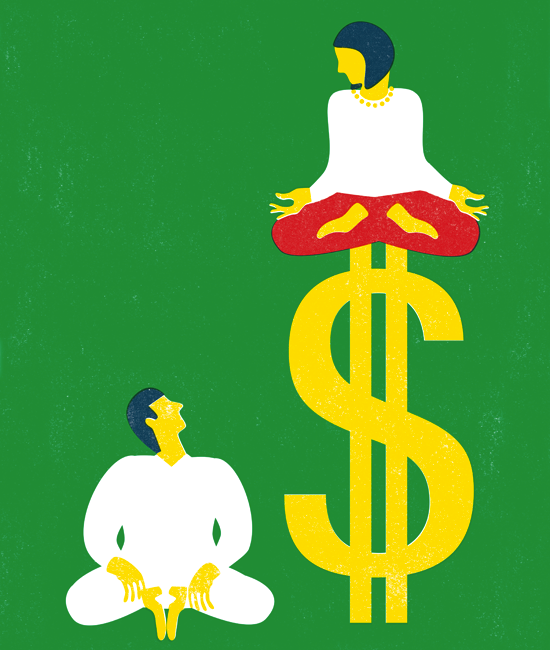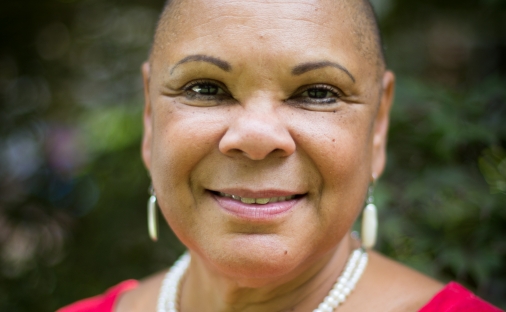This year, we once again turned the Tricycle “wheel of dharma” in our usual thoughtful yet provocative—and (we like to think) occasionally funny way. Self-described white trash Buddhist Brent Oliver taught us that the future of Buddhism depends on who it belongs to, author Ruth King explained how to transform anger into wisdom, and writer Allan Badiner brought us to the Nevada desert to see what the dharma looks like at Burning Man. Take a walk with us down memory lane to look at the articles that made this year at Tricycle one to remember.

From the Magazine:
In one of the most talked about Tricycle articles of the year, a minimum-wage earning Kentucky native, Brent Oliver, gives a firsthand account of the prohibitive costs and alienating cultural norms of dharma practice in the United States that put enlightenment beyond his pay grade.
Remember the last time you saw a floppy disk? For Jeanette Tetsu, daughter of former Chan monk Bhikshu Heng Ju, it was back in 1998, shortly after her father’s death, when she happened upon the memoirs that detailed his life’s struggle with alcoholism, self-judgment, and eventually, acceptance. Her story and that of her father were published for the first time in Tricycle.
In this interview with the Dalai Lama’s translator, Thupten Jinpa Langri, he acknowledges the importance of the ongoing conversation between Buddhism and science but says the benefits may prove more limited than Westerners expect. “In the end, when it comes to spiritual practice,” he explains, “you are your own best proof.”
Take a romp to the orgiastic Burning Man festival, where Tricycle contributing editor Allan Badiner spent a night among Buddhists offering care to those partygoers in the midst of a bad trip.
In one of our most eloquently written articles of the year, Tricycle contributing editor Mary Talbot delves unblinkingly into the inevitable insecurity and loss that accompanies a mother’s relationship with her child. “The version of okay we sell to our kids and to ourselves,” she declares, “the okay that parents are meant to provide in this world—is untenable.”
The prevalence of meditation among Western Buddhist practitioners makes it seem as though it has been central to the Buddhist religion all along. Yet, as scholar Erik Braun points out in this thorough historical treatment, the rise of lay meditation is a very recent phenomenon born out of Burma’s mid-20th century anti-colonial movement.
In the Fall 2014 issue’s cover story, Zen Buddhist teacher Ezra Bayda posits that our very desire for uniqueness is what impedes true liberation. Rather than aspire to special distinction, we should let our natural being arise, thereby freeing ourselves to relate honestly with the people and activities we hold dear.

From the Web:
In our most popular online video retreat of the year, Buddhist teacher and author Ruth King instructs us on how to properly channel the intensity of strong emotions like rage in order to get in touch with the seeds of radiance and joy that are accessible within us.
Andrew Holecek: The Good Death
Tibetan Buddhist teacher Andrew Holecek makes a persuasive case that the practices that ensure a peaceful death are also vital to a well-lived life. He then equips us with the skills to make those dual aspirations a reality. Tune into one of the most listened to podcasts from our successful new series.
In this highly controversial interview, Brown University professor and neuroscience researcher Willoughby Britton casts doubt on the science driving the popularity of mindfulness meditation.
This incisive article tells the story of how the Dalai Lama became an unwitting spokesman for free market capitalism.
Noah Levine, author and founder of a dharma-based substance abuse rehabilitation program called Refuge Recovery, explains what differentiates his approach to fighting addiction. “We can take the suffering of addiction,” says Levine, “and turn it into a path that ends not just the suffering of addiction but all human suffering.”
In September, a terminally ill young man named Asher Lipson asked Tricycle to publish his writings. Tragically, he passed away before we could do so. But Asher’s request was granted shortly thereafter with this journal entry, wherein he grapples with the question of how best to use what little time he has left.
Can we love our families fully while upholding the Buddha’s teaching on nonattachment? Tibetan Buddhist teacher Lama Jampa Thaye answers with a resounding yes in this description of how our familial relationships actually offer the perfect opportunity for cultivating genuinely felt love.
Thank you for subscribing to Tricycle! As a nonprofit, we depend on readers like you to keep Buddhist teachings and practices widely available.